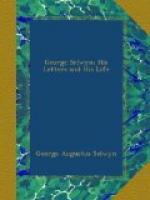Lord Stafford has just been with me. He says that he had a letter from Windsor this morning. The K. passed a quieter night, but I do not find out that he is less to-day what we are obliged to call him now. It is a new event, and a new language never heard before in the Court. Me de Maintenon would say, “Heavens! Do I live to call Louis 14 an object of pity?” You remember that pretended letter of hers, which was said to be dropped out of Me de Torcy’s pocket at the Hague. (Do I live) to speak of my master at last as a lunatic(?) —Burke walking at large, and he in a strait waistcoat! Charles wrote a letter to the Prince the day he came. He wrote it about noon, and at one the next morning he received his R.H. answer. I wish Craufurd would pick it out of his pocket to shew me.
There may be another adjournment, as I am told. Business can be suspended a little longer. If supplies are wanted much in some places, they can be postponed in others. So the Cardinal de Rohan(256) is then chosen President of the States,(257) is that the phrase? But he is chosen President toujours of the notables,(258) or something. This I had last night from the Marquis de Hautefort.(259) What this Marquis and Grand d’Espagne has to do out of France at this time I have as yet to learn. I see that I am to have the introduction of him everywhere. He thinks me a man d’une grande existence dans ce pais. He says that I am lie avec M. Pitt; he wants me to present him to him. He fancies that the P(rince) has a convert here whenever he pleases. It is my singular fate for ever to pass for something which I am not, nor cannot be, nor desire to be —sometimes indeed for what I should be ashamed to be. But I am used to this. On se trompe, on se detrompe, et on se trompe encore. I do not find, au bout du compte, that it signifies anything. With one’s friends one must be known, tot ou tard, to be exactly what we are.
(255) Angelo, Comte d’Elci, born in Florence in 1764, an, Italian philologist and archaeologist. He died in 1824.
(256) Louis-Rene-Edouard, Prince de Rohan (1734-1803). In 1760, soon after taking orders, he was nominated coadjutor to his uncle, Constantin de Rohan, Archbishop of Strasburg and Bishop of Canopus; in 1761 elected member of the Academy; in 1772 ambassador to Vienna on the question of the dismemberment of Poland; in 1777 made Grand Almoner of France; in 1778 Abbot of St. Vaast and cardinal; in 1779 succeeded his uncle as Archbishop of Strasburg, and became Abbot of Noirmoutiers and La Chaise. He led a gay, luxurious, and extravagant life rather than performed his clerical duties; he had political ambitions, but he was never able to overcome the predisposition against him with which Marie Antoinette had come to France. He was a dupe of Cagliostro, and of Mme. de Lamotte-Valois, the adventuress who, in 1782, drew him into the intrigue of the diamond necklace, for which he was sent to the Bastille, and which gave him the name of le cardinal Collier; he was acquitted in 1786, and in 1789 elected to the States-General; in 1791 he refused to take the oath to the Constitution, and went to Ettenheim in the German part of his province, where he died on the 17th of February, 1803.




